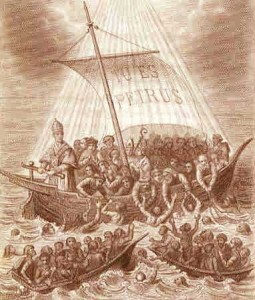Dear Father John, I am confused. Jesus said he is the way the truth and the light, but the Church has moved away from believing salvation lies only in the Church. Even learned people in the Church (my Spiritual Director included) now say that God is bigger than we can comprehend so we  need to be open to the possibility that God is calling even those outside the Church. It makes the line very gray as to the purpose of evangelization. Can you comment? Thank you.
need to be open to the possibility that God is calling even those outside the Church. It makes the line very gray as to the purpose of evangelization. Can you comment? Thank you.
I hope that the answer to this question will be simpler than you might have thought. This question has generated reams of theological speculation, argument, and even bitter diatribes. In fact, it became so problematic back in the eighties and nineties that the Congregation for the Doctrine of the Faith, under the leadership of then Cardinal Joseph Ratzinger, actually published (with the full approval of Blessed Pope John Paul II) a thorough treatment of the issue, which you may want to read (give yourself some time and a full pot of tea; it is a rich, but somewhat long and somewhat dense). The document is called Dominus Iesus.
Christ and Bridges
The short answer to your question is this: Anyone who ends up in Heaven is a member of the Church. Heaven is communion with God, it is being a fully mature member of his family. The only bridge to Heaven is Christ – he is the only Savior, and only his self-sacrifice on the Cross opened the gates of Heaven and atoned for human sin. I believe that all the “learned people in the Church” you refer to in your question would agree with those statements. If they don’t, well, you will have to ask them to explain to you how they understand numbers 846 and 847 of the Catechism.
Now, in theory it is possible to cross a bridge without knowing the name of that bridge. You can even cross a bridge, in the fog, for example, without realizing that you are crossing a bridge. This is an image that can help us understand how a person could be saved, could enter heaven and become a full member of God’s family for all eternity, without being a Catholic here on earth. The condition for that, according to Church teaching, is that the person in question, through no fault of their own, “do not know the Gospel of Christ or his Church” but even so “seek God with a sincere heart, and moved by grace, try in their actions to do his will as they see it” (Catechism, #847).
Our Limits and Our Calling
Obviously, you and I are incapable of judging whether some are seeking God with a sincere heart, or whether their non-membership in the Catholic Church is “through no fault of their own.” Furthermore, through God’s Providence, we have come to know the name of the bridge; we have been given, by the sheer gift of God’s grace, the wisdom “for salvation through faith in Jesus Christ.” The greatest act of love we can make towards our neighbor is to share that faith with those haven’t yet received it, or who have lost it. As Pope Benedict XVI affirmed in his first public homily as Pope: “… the purpose of our lives is to reveal God to men… There is nothing more beautiful than to know Him and to speak to others of our friendship with Him.” This is the meaning behind what the Church has always called – and still calls – the “missionary mandate” (Catechism #849): “Having been divinely sent to the nations that she might be ‘the universal sacrament of salvation,’ the Church, in obedience to the command of her founder and because it is demanded by her own essential universality, strives to preach the Gospel to all men.”
Means vs Ends
The main point of recent discussion about these truths has to do more with the way we approach this missionary mandate, not its validity. Since the Second Vatican Council, the Church has made a concerted effort to reach out to people of other religions in a respectful way – respecting them as people, respecting the search for truth and salvation that their religion represents – and not with a condemning tone.
A few years ago, I wrote a couple of short essays on the subject of a Catholic’s view of non-Christian religions, and of non-Catholic Christians. They are available for reading and downloading here. You may want to read them over and reflect on them.
But make no mistake about it. Although we are called to respect all people and their search for religious truth, Jesus Christ alone remains the Way, the Truth, and the Life, and all salvation comes from him “through the Church which is his Body” (Catechism #846).


